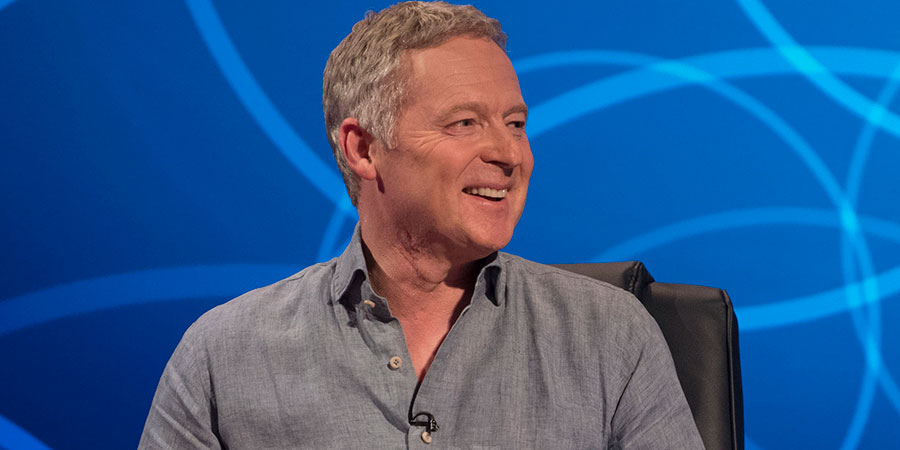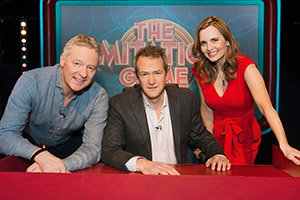Rory Bremner interview

What appealed to you about The Imitation Game?
There's a great freshness about it. Like all really good ideas, you say to yourself, "Why hasn't anyone thought of that before?" The DNA of the show comes from Graeme Garden and Jon Naismith, the team behind Radio 4's I'm Sorry, I Haven't A Clue. It's that same tremendous basic idea of getting talented people together and giving them silly things to do.
Can you expand on that?
This show works on lots of different levels. There is the sheer fun and joy and spontaneity of impressions. I also love the idea of characters doing very unlikely things - like Alan Bennett reading Joey Essex's autobiography. In addition, there are all sorts of different challenges on The Imitation Game. It's constantly inventive and has an amazing laugh per minute ratio. It's been a marvellous opportunity and such an enjoyable show to make. It's right up my street!
What have you especially relished about working on the show?
There has been a really refreshing sense of being able to work with people you've admired for a long time and to find a mutual respect between impressionists. It's a very collaborative show. Getting to work with people like Alistair McGowan, Ronni Ancona, Jan Ravens and Jon Culshaw was lovely. It's always fun watching impressionists who 'own' particular voices. Jon owns Tom Baker and Russell Crowe. Alistair owns Richard Madeley, Gary Lineker and Frank Skinner. I love Debra's Cheryl Cole and Lorraine Kelly. Jan does a wonderful Theresa May, Joanna Lumley and Diane Abbott. It's incredible to watch them in action.
Anything else?
I also really enjoyed working with impressionists coming through like Luke Kempner and Jess Robinson. Debra and I are there to help showcase them. I love encouraging young people. It's a great joy to find new talent.
How would you characterise the approach of The Imitation Game?
It's a new and inventive format for impressions, and generous, too. Panel games often encourage jeopardy, rivalry and sly competitiveness. But this is simply about the sheer fun of playing and sparking off the other impressionists. It's such a joy to collaborate with people whose work you've always loved. This is also a format that is not one-dimensional. It offers a lot of variety and imagination.
Did you enjoy working with Debra?
Absolutely. She is so talented. She is a real star. Her Lorraine Kelly and her Cheryl Cole are to die for. But her true strength is singing. When she lets rip with Shirley Bassey or Celine Dion or Adele, it's properly good. I just sit there in awe.
Was it hard work?
Yes! I must have done over 70 different voices over the course of the series. It makes you work and puts you through your paces. If you were to compare it to dancing, it's like doing impressions upside down, backwards and in heels! In some ways The Imitation Game is to impressions what Strictly Come Dancing is to dancing: the participants are being pushed to come up with something different every week. It's challenging for the performers, but it's always highly entertaining. It's also worth it as you know only the very best stuff will make it to the final edit. It makes for a fantastic show in the end.
Do you have a favourite round in The Imitation Game?
I love the music round. I really enjoyed doing Chas and Dave singing Leonard Cohen's Hallelujah and Prince Charles singing Gangnam Style.
Why do we adore impressions so much?
People love the surprise of watching someone producing a voice they just weren't expecting. It's the simple frisson of someone sounding like someone else. There is an element of witchcraft involved. It's like ventriloquism - audiences look at an impressionist and think, "How on earth did you manage to do that?"
Where does our love of impressions stem from?
It goes back to school and the sheer joy of hearing someone impersonate a teacher. Later on, you get the full satirical effect of an impressionist owning someone else's voice and being able to say things they'd never say. That's really funny. And the next time you see that person, some of that satirical impact remains. So it's about lampooning authority and at the same time capturing the essence of people.
Is this a good time to be making The Imitation Game?
Definitely. We're in the midst of a turbulent and volatile political period, so I'd argue that this is a very good time to be doing this. I have bored myself with saying that during the Coalition, Chris Grayling, Jeremy Hunt and Philip Hammond weren't that promising for impressionists. But of course, we've got Nigel Farage, Boris Johnson and Donald Trump. This is a far from dull time. It's the perfect moment to be making The Imitation Game. At last, here's a vehicle where impressionists can really do their stuff!

